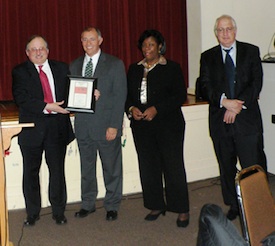History Of The Campaign
Search
2008 Award Ceremony

From left: Dennis Frado, Lutheran Office for World Community; Martin Rendon, U.S. Fund for UNICEF; Sullivan Robinson, Trinity Development Corporation and former executive director, Congress of National Black Churches, and Arnold Kohen, international coordinator, Global Priorities Campaign.
History
International Statement 2010
An international statement in 2010 was endorsed by the Vatican, The Lutheran
Global Security Priorities Resolution Event Material
Enclosed are documents from the Global Security Priorities Resolution meeting held Feb. 7,
A Marshall Plan For The Third World
WITH the international donors conference for millions of earthquake victims in Kashmir
A Brief History of Global Priorities
In 1999 a group of concerned individuals from differing faith traditions initiated Global Priorities to begin to explore ways to address the imbalance between world military spending and expenditures on unmet human needs. Global Priorities held a series of international meetings to confront questions of human security more broadly. There was a consensus that focusing on child survival would be the initial emphasis.
Global Priorities was officially launched in October 2005 at UNICEF. By that time, it had become increasingly evident that nuclear arsenals and nuclear threats were prime issues of international concern. An effort was therefore undertaken to address both nuclear issues and child survival in the U.S. political context through bipartisan Congressional action to lay the groundwork for broader international progress. In 2008 Reps. Jim McGovern (Democrat of Massachusetts) and Dan Lungren (Republican of California) first introduced the Global Security Priorities Resolution in the U.S. House of Representatives. The initial Resolution attracted 36 House members as co-sponsors and the endorsement (PDF) of 25 religious and secular organizations. Our international sponsorship has expanded to include many well-regarded individuals.
In the years that followed, the Congressional Resolution generated discussion among a range of experts on nuclear weapons, including military leaders in a number of declared Nuclear Weapons States. In short, the Resolution has become a stimulus for activities calling for proceeds from reductions in nuclear arsenals to be devoted to humanitarian needs such as alleviating hunger, and promoting child survival, health and education, while reducing dangers posed by nuclear weapons. Inter-religious efforts facilitated by Global Priorities continue to set in motion an international process to make this formula a reality in an increasingly dangerous world.





